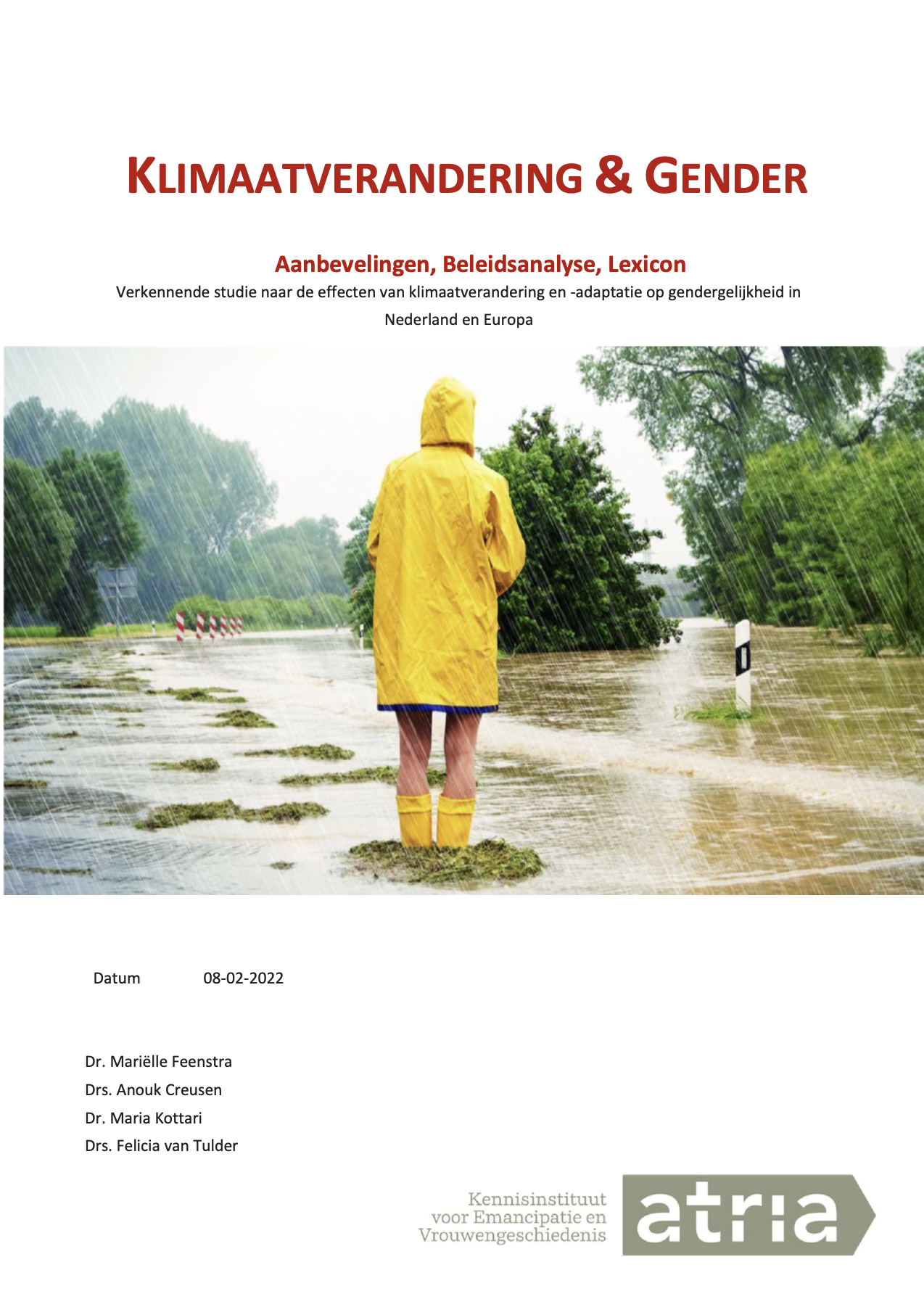Climate change & Gender
Exploratory study into the effects of climate change and adaptation on gender equality in the Netherlands and Europe
Dr. Marielle Feenstra, Drs. Anouk Creusen, Dr. Maria Kottari, Drs. Felicia van Tulder
Februari 2022
Citation
Feenstra, M., Creusen, A. Kottari, M., Van Tulder, F. (2022) Klimaatverandering & Gender | Aanbevelingen, Beleidsanalyse, Lexicon Verkennende studie naar de effecten van klimaatverandering en -adaptatie op gendergelijkheid in Nederland en Europa
MANAGEMENT SUMMARY
The Ministry of Education, Culture and Science by the Emancipation Department has commissioned Atria Knowledge Institute for Emancipation and Women’s History to investigate the intersection between gender and climate and to come up with recommendations as input for the 66th meeting of the UN Commission on the Status of Women (CSW) to be held from 14 to 25 March 2022. In-depth research into the effects of climate change and adaptation is indispensable and the Ministry of Education, Culture and Science identifies a knowledge gap regarding the national, Dutch context, and developed countries in general.
Understanding is needed to understand the consequences of climate change and adaptation for different groups, in this case women, from an intersectional gender perspective and to be able to make a comparison with the situation in comparable EU Member States, resulting in a series of recommendations for the further development of Dutch policy on Gender and Climate.
In the advice and measures, a distinction must be made between:
- The impact of climate change on gender equality, and vice versa; the consequences of gender equality on (combating) climate change. The increase in extreme weather events is an example of a consequence of climate change.
- The impact of climate policy on gender equality, and vice versa; the impact of gender equality on climate policy. The initiated energy transition is an example of a policy choice, made to reduce emissions and curb climate change.
The advice and measures presented in this report are based on national and international knowledge, developments, advice and examples in the field of gender and (the effects of) climate change, as included in resolutions and covenants endorsed by the Netherlands and issued by the United Nations. and the European Parliament.
The recommendations are divided into 7 focus areas:
- Implement existing regulations and international conventions
- Data, research and monitoring
- Financing and institutional support
- Anchoring gender equality in policy development
- Knowledge sharing / knowledge gaps / information backlog
- Individual’s responsibility for climate impact
- Representation, participation, inclusion and participation
The first recommendation paints a rich and well-understood, but fragmented, picture of existing knowledge and regulations, resulting in the perception of a knowledge gap. However, at European and International level, this knowledge is indeed interwoven in existing resolutions and there is no knowledge gap in the field of Gender and Climate.
At the national level, there is a lack of cohesion between gender and climate policy and little attention is paid to the consequences of the choices made within climate policy on gender equality. The harrowing increase in energy poverty among women is an underexposed example of a lack of embedding gender equality in policy development.
Recommendations 2-7 are instrumental in implementing recommendation 1 but lag in implementation. In this report, the recommendations are illustrated with practical examples of practices worth replicating.
The (further) development of Dutch policy on Gender and Climate starts with the national implementation of existing international resolutions, in gender and climate policy.
In addition, it is important to measure and monitor the consequences of these policy choices to make progress in combating climate change and promoting gender equality.





